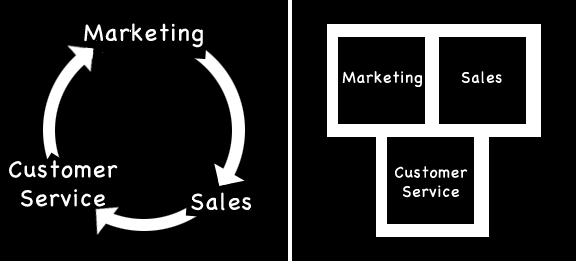
I have a good friend who is from New York, so he is not shy
about expressing his opinion. He works in B-to-B sales, so he is in and out of
businesses day after day. He sees a lot of management styles - some good, some
not so good. He has a saying that he quotes any time he finds a business where
a manager has chosen to look the other way when something is going wrong. Even
though it is obvious to everyone that there is a problem, it would be uncomfortable
to make it right. So the manager just lets it go on. Here is what my friend
says in those situations: What you permit, you promote.
Now let me relate that bit of advice to managing your marketing
efforts. Many times someone in your company who is in charge of marketing knows
there is a disconnect between what is happening with the customer on the
marketing end of things, and what is happening in sales. They almost operate
independently of each other. Along the same vein, there can be a similar
disconnect between customer service, sales, and marketing, where customer
complaints never get fixed on the front end of your sales process. Let’s face
the facts: a discontented customer is a marketing and sales problem every bit
as much as it is a customer service problem. There are just too many choices
for people today to think you could retain a discontented customer if you don’t
fix their problem. And customer retention is a marketing and sales issue. What
you permit, you promote, especially if that customer is upset enough to take to
social media to start complaining.
In today’s business environment, marketing touches
everything that touches the customer. Marketing has to take the lead whenever
there is any contact with a customer. Segmenting the customer relationship into
several different business departments is a thing of the past. Why? Because
customers expect your business to be fluid. If they have a problem, they expect
one point of contact to solve all of
their issues. There is nothing more frustrating than being passed from one
person to another trying to solve a rather simple problem from the customer’s
perspective. Marketing has to take the lead because the customer relationship
is key to everything we do in marketing. Think about it, when we promote a
brand, what are we really doing? We are trying to shape the way a customer
feels about the brand. When we are writing a blog, we are trying to engage the
customer in something that interests them. When we produce an ad, we are trying
to appeal to the customer’s senses to entice them to buy from us. When the
customer makes a first purchase, we do a customer satisfaction survey to make
sure they have good feelings about us. What is the common denominator here? The
customer is reached in each and every marketing effort.
If you are experiencing a disconnect between marketing,
sales, and customer service, I would suggest you do two things. First, rewrite
the way you go about promoting your business brand with the customer to be
based on their needs and desires. Being customer-centric is key to effective
marketing. Second, form a plan that works in a circular motion rather than a
straight line from marketing to sales to customer service. Whenever marketing,
sales, and customer service operate independently of each other, I can
guarantee you have customers falling through the cracks in your system.
Whenever you can, sales and customer service need to coordinate solutions to
customer problems. And marketing needs to be there to shift your marketing
message based on actual feedback from customers. I find that those in sales
know what is working in marketing. Depend upon this feedback. I also find that
those in customer service know the problems in the system. Marketing is needed
to emphasize what is working and to use the solutions to customer service
problems to help retain your customers for further purchases.
Marketing is changing. It touches much more than it used to.
If you are in charge of marketing, make sure you are taking a holistic approach
to marketing through both sales and customer service activities.